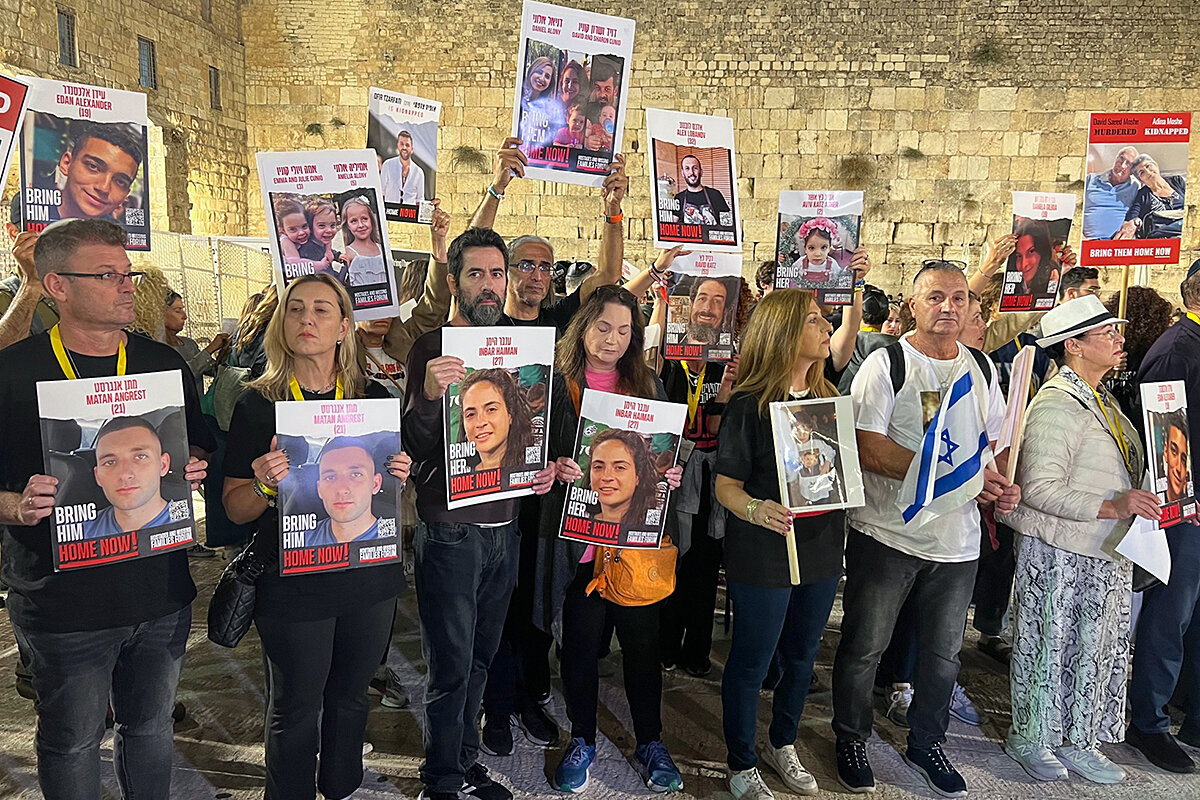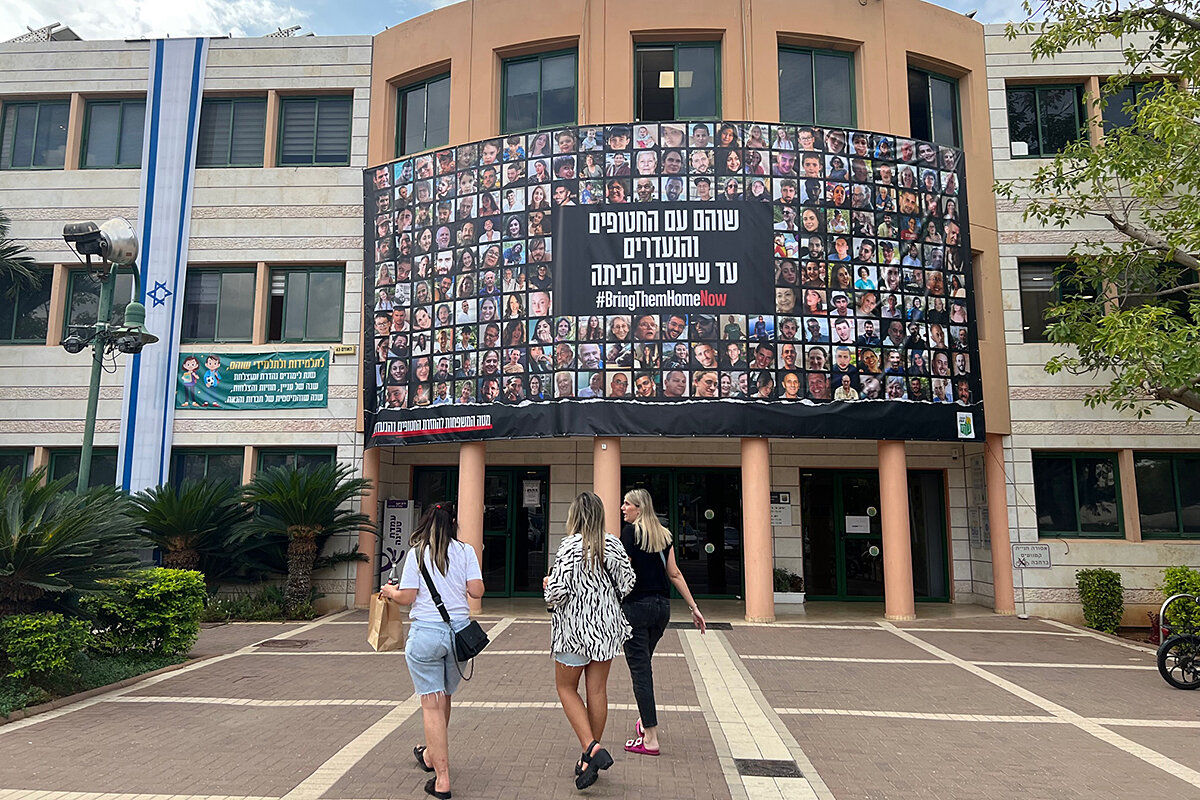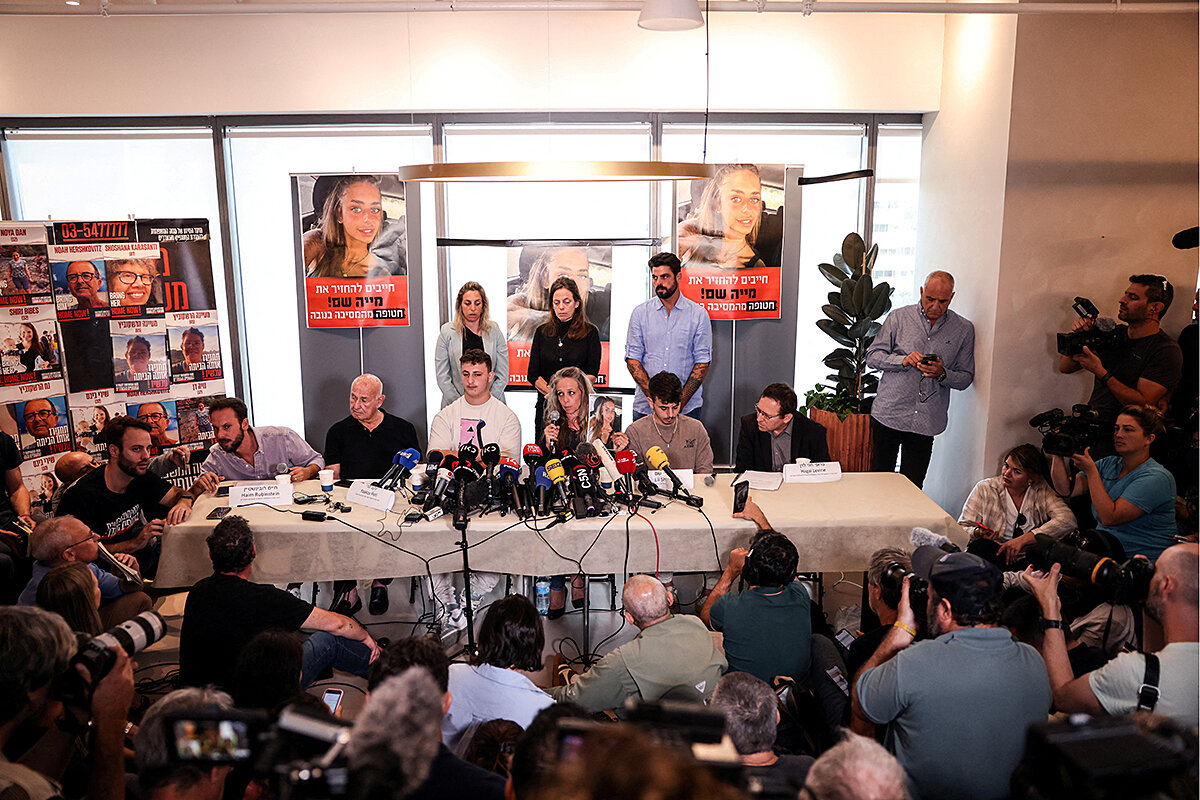Amid war’s gloom, Mia’s family yearns for its shining star’s return
Loading...
| SHOHAM, Israel
Keren Schem rubs two fingers over the tiny-script Hebrew tattoo that encircles her wrist like a bracelet, and offers her best English translation.
“You are the only star in the sky, you are bright and shiny,” she says. Still looking down at the words her fingers caress, she says, “Every day I am praying to God that Mia is seeing a star in the sky.”
Keren Schem is the mother of Mia Schem, one of the estimated 239 hostages that Hamas, the militant organization that rules the Gaza Strip, is presumed still to be holding captive in Gaza.
Why We Wrote This
A story focused onIn a war where brutality seems to be in flood tide, this is a story about a mother seeking an eddy in the inhumanity: the return of a daughter taken hostage. Placed at the center of a crisis that has divided the world, she just wants her child to be safe.
Mia was attending the Nova rave in the desert near the Gaza border on Oct. 7 when Hamas fighters staged their surprise cross-border attack. They rampaged through small communities and the music festival, killing more than 1,200 Israelis and other nationals, and wounding and sexually assaulting many more.
Then there was the unprecedented mass abduction of hostages back to Gaza, all, like Mia, the bright and shiny lights of some family somewhere, but mostly, like the Schems, in Israel.
The Hamas attack sparked an unforgiving Israeli bombing campaign and ground invasion in which more than 11,000 people have been killed and much of Gaza, an area less than 1/15th the size of Delaware that 2.3 million Palestinians call home, destroyed.
And now, a month after the mass abduction, the hostages’ families are living with the terrible knowledge that their loved ones are the one slim sliver of humanity that has had to endure the violence and trauma of both Oct. 7 and its aftermath.
“Mia is strong; she is very brave,” Keren Schem says. “But every day I worry how even she can handle all of this.”
Seated in her sun-splashed, stark-white apartment in Shoham, the tidy community near Tel Aviv’s Ben-Gurion Airport that is 21-year-old Mia’s home, the single mother of four describes the daughter she misses terribly. With Mia’s older brother, Eli, at her side and Tyson, the family dog, underfoot, she implores the world to remember the hostages as if they were their loved ones.
“Mia is 10 million times more beautiful on the inside than the outside – and she is beautiful,” she says. Mia paints; she cooks for her family. Before Oct. 7 she was planning to launch her own tattoo studio.
“She is loyal, she is warm, and she is something like the rock of our family,” Keren says. “And I know these are the things any mother would say,” she adds, “so I ask every mother, every father, every sister ... brother, ‘Just think about it for one minute; think about [the hostages] like they are your own.’”
Information void ... then rumors
Keren recounts the excruciating hours and then days of an information void that followed after receiving the one piece of evidence that Mia had been caught up in the attacks: an Oct. 7 text message Mia sent to a friend, imploring, “They are shooting at us, help come save us.”
Then on Oct. 16, Hamas released videos of two hostages confirming they were being held captive. One was Mia. To her family, she says, “Please get us out of here as soon as possible.”
And since then, nothing.
The Schem family has been subjected to the ups and downs of the hostage issue: what she calls the “rumors” of imminent releases, the news of high-level diplomatic negotiations across the Middle East.
Keren recalls the elation she felt with the news that two women would be released – “Please yes! Let it be my baby” – and the bittersweet letdown when indeed two women were released Oct. 23, after two others days earlier. But Mia was not one of them.
And she is aware that this week is producing another flurry of release rumors.
Indeed, President Joe Biden has dispatched his Middle East envoy, Brett McGurk, to the region to pursue what U.S. and other officials confirm privately could be a “swap” deal of up to 70 female and child hostages for an equal number of women and children among Israel’s hundreds of Palestinian prisoners and detainees.
Community support
On a personal level, Keren Schem says she couldn’t expect more from her community.
“Shoham is the best you could ask for. They bring food every day; they ask what you need and how they can help. That’s something good you can say about Israelis,” she adds. “We are there for each other no matter what.”
Indeed, in Israel one month after the attacks, it is impossible to go a day without multiple reminders of the hostages, from posters demanding, “Bring them Home Now!” which hang from overpasses and balconies, to flyers plastered everywhere with photos from a happier time.
Every day there are rallies and other observances aimed at keeping the hostages top of mind – like Sunday’s women-only demonstrations that filled big-city squares and small-town public spaces alike, including the central traffic roundabout in Shoham.
The Schems are French Israeli, and so Keren has met with senior French officials, including French President Emmanuel Macron and Foreign Minister Catherine Colonna. On a trip that Keren and Eli took to France last week, they met France’s first lady, Brigitte Macron, as well as two former presidents.
And yet, she says that mostly when she goes to bed at night – one eye on 10-year-old daughter Danny, who since Mia’s kidnapping has been sleeping in her bed – her mind wanders from all the terrible questions she asks herself about Mia to worries that the hostages are slipping from the world’s attention.
“I know this is one of the most complicated crises the world knew, and I can’t believe I’m part of it,” Keren says. “But I ask everyone to remember that maybe this happened in Israel, but it is a crime against humanity. And if this evil is not stopped,” she adds, “it will get to their children and wives, their babies.”
A sense time is running out
President Biden, in addition to his other diplomatic efforts, has been pressing Israel for a four-to-five-day “pause” in its campaign in Gaza to allow for significant humanitarian aid deliveries and the release of some hostages.
On Monday, White House national security adviser Jake Sullivan characterized negotiations for a hostage release deal as “continuing to make progress day by day, hour by hour.” Hamas, which released a video and photograph of an Israeli hostage who it said was killed by Israeli shelling, also released a video of three Israeli women calling on Israeli Prime Minister Benjamin Netanyahu to do more to secure their release.
But for Mia’s family, the diplomacy is taking too much time – something it fears that for the hostages could be running out.
“We know people are working on this, but for Mia and the other hostages it’s been a month already,” says brother Eli. “I’m believing in my heart that Mia is alive, but part of me has to know that she could be dead.”
And that would be unbearable for Eli, whose voice cracks and who pauses, briefly unable to speak, when asked what Mia has meant to him.
“You have to know Mia,” he says. “She has so much love and she is so mature; you think she is like a mom or a big sister,” not the slightly younger sister she is.
Despite her focus on Mia, Keren says she also worries every day about the impact the family ordeal is having on her other children.
She worries about her 17-year-old son, Ori, who unbeknownst to her spent his nights after Oct. 7 poring over Hamas videos and the fighters’ GoPro recordings posted online, exposing himself to the atrocities they committed, desperate to see if he could catch some glimpse of Mia.
She worries about Danny, who only Monday agreed to return to school, convinced by her mother that she had to start “getting back to normal.”
A family tattoo
As for Eli, he is planning for the day Mia returns.
“If you spend all night thinking what Mia is feeling, who is she with and how is she living, you can go nuts,” he says. “So I try to think what it will be when she is home.”
His sister will make kubbeh, the hearty dumpling soup she loved to prepare for her family. She will paint, perhaps in the style of Frida Kahlo, whose portrait is on the family apartment wall.
“When she is back, she will make a tattoo for all of us, she will,” says a resolute Eli.
And that tattoo, what will it be?
“I think,” he says, “it will be written, ‘Mia.’”









